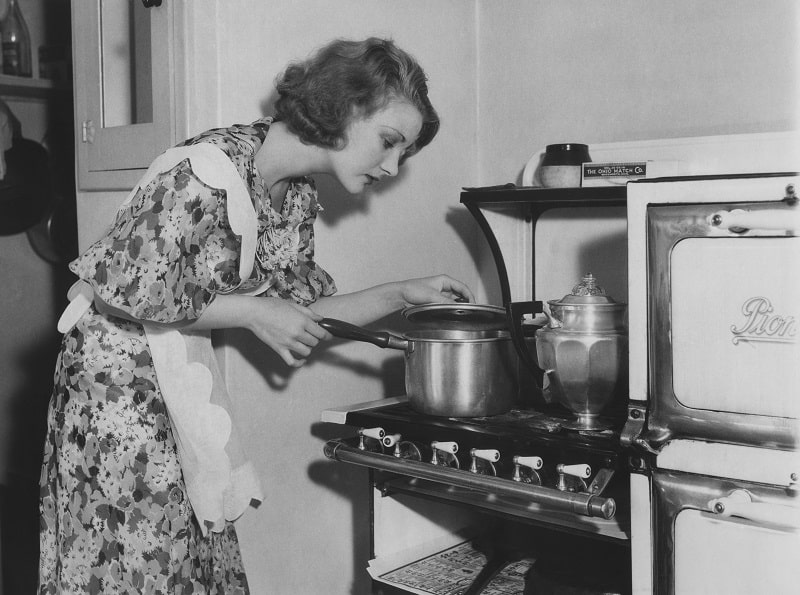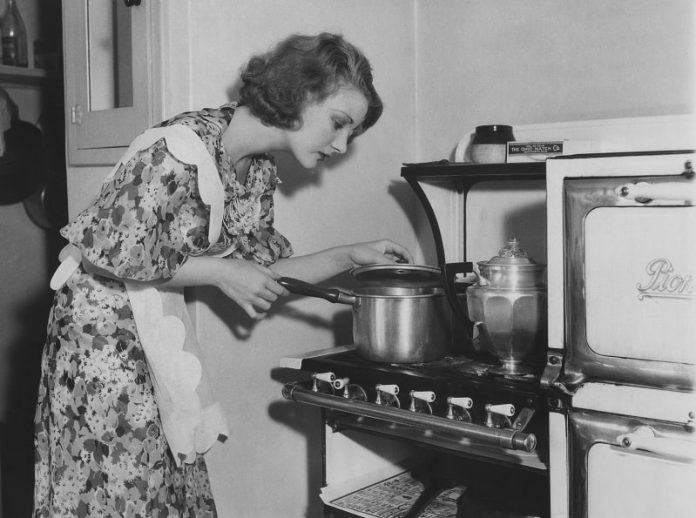I remember the first time I came across the phrase à l’anglaise in a French recipe: it was telling me how to cook the green bean element of the dish. What a daft instruction, I thought – there are so many ways we cook food in Britain. What on earth could it mean?
I consulted a French friend, who informed me, while having the good grace to look suitably apologetic, that it meant ‘cook it in the most boring way possible – so with vegetables, just boil them’.
The French, it seems, can’t resist cocking a snook at English cuisine and according to French dictionary Larousse à l’anglaise does indeed mean ‘cooked in water or steamed’. None of your fancy gourmet tricks here, thank you very much.
So veggies are served plain, having been boiled; meat is poached or boiled; and fish, in an exciting departure, can either be poached or breadcrumbed and fried. Dishes à l’anglaise are served without a sauce or, if you’re feeling daring, melted butter.
The rivalry over culinary style is as old as the English Channel, with les français calling us Brits ‘les rosbifs’ and we in return dubbing our Gallic cousins ‘frogs’. Back in the 18th century, Voltaire wrote, “il y a en Angleterre soixante sectes religieuses différentes, et une seule sauce” (there are 60 different religious sect in England and just one sauce). And more recently, while president of France, Jacques Chirac dubbed England’s food the second worst in Europe (after Finland) and declared that you can’t trust a nation with such terrible cuisine, apparently giving Vladimir Putin a good old belly laugh with his bon mots.
I needed to know more and where better to turn than the French version of Wikipedia? It is, after all, written by real people and as such would give a fairly accurate snapshot of France’s present-day attitude to Britain’s culinary state of affairs.
“Traditional English dishes have ancient origins, such as bread and cheese, roasted and cooked meats, meat and game pies, and freshwater and seawater fish,” it says. “Other common dishes [include] fish and chips, traditionally served in a newsprint wrapper with salt and malt vinegar, and bangers and mash, a type of sausage served with mashed potatoes, onions and gravy”.

Junk food, spaghetti bolognese and curries are also popular and the page charts the rise of celebrity chefs and the gastropub. It continues: “Sunday roast is without doubt the most common dish in English cuisine and traditionally includes roast potatoes that accompany a roast meat (such as beef, lamb, or chicken) and vegetables, which are usually roasted or steamed and served with gravy. A Yorkshire pudding often accompanies the main course, although traditionally it was originally served the next day with leftover roast (the practice of serving a roast on Sunday is down to the amount of work it requires, and the custom of the housewife to perform weekly laundry on a Monday, when the cold leftovers of the previous day’s roast make for a quick meal).”
Game, such as venison, is popular among the upper classes, we are told, thanks to famous chefs such as Anthony Worrall Thompson, “although they are not regularly consumed in the average household”.
Fish and chips, scampi and steak and kidney pie all get a mention, with mushy peas being explained as “roughly crushed and cooked petits pois”. The next area of note is breakfast.
“The full English breakfast also remains a culinary classic,” French Wiki tells us. “ Its content varies but it often consists of bacon, grilled tomatoes, toast, black pudding, baked beans, mushrooms, sausages, eggs (fried, scrambled or poached)and other items.” This, we are told, is usually eaten in cafés, with cereal being the more common breakfast at home, while for kids, boiled egg and soldiers (mouillettes) remains popular.
Toad in the hole, pork pies, Cornish pasties (described as a sort of calzone) and jellied eels all get a mention, as does the sarnie: “England is at the origin of the world-famous term ‘sandwich’, although, although the eponymous Count was not the first to add a garnish to bread.” And then of course, there’s our vast array of chutneys and pickles.
Then there’s rather startling news: “The principle of ‘three breakfasts a day’ can be applied by eating bacon sandwiches, often referred to as bacon sarnies or bacon butties, at any time of the day or night.” It’s the first time I’ve heard of the “trois petits déjeuners par jour” but I suppose you shouldn’t knock it until you’ve tried it!
The Wiki page concludes: “English cuisine suffers, internationally, from a relatively miserable reputation, compared to that of Italian and French cuisines. However, this perception of English food may seem… outdated: the bad reputation of urban food products produced industrially in the 20th century never really represented the quality or taste of the food consumed at home.”
Home cooks around the UK, take a bow: your skills have been recognised by the French.








Unfortunately one of the basics of northern English gastronomic culture and pleasure is missing – the “chip butty” – which consists of two slices of white sandwich bread concealing delicious hot “chips”, otherwise known as “pommes frites”. Sounds terrible, but actually tastes much better than one would surmise.
Apart from that, British cuisine is excellent, the only problem being that starting with the First World War and going into rationing till 1952 and then later, nobody, up to a few years ago, had a clue as to how to cook anything properly. Except of course the French – and myself, becoming immortally known for producing a “Shepherd’s Pie” for a party at the French TEFAL headquarters in Frankfurt, Germany with the company logo in mashed carrot baked into the golden potato crust.
We toured England, Wales and Scotland on a coach tour for two weeks in the spring of 2019. Meals on the tour were adequate but generally uninspiring, rating perhaps 6/10. The only tour meal which stands out was a really, well organized and well prepared, hot breakfast served at a hotel far up in the Scottish Highlands. Two meals that do stand out in memory were at restaurants which we found ourselves. One was at a small but delightful French creperie near our Kensington hotel in London. The other was a meal was at a Chinese restaurant which we and two fellow travelers happened on in Liverpool.
My partner – he’s French and we’ve been together for 22 years – was horrified in the early days of our relationship when I proposed making ‘Toad in the hole.’ ‘Vraiment? He gasped. ‘Un crapeau? Un CRAPEAU?
As for English food – to be honest, I prefer to cook and eat French and do so every day:
https://www.instagram.com/stephencooksfrench/
Being born and bred in East London, living in France for the last 18 years, I still miss a local delicacy of pie and mash with liquor. The minced beef pie is served with mashed potato scraped onto the side of the plate and a parsley sauce, green in colour. It’s nothing like you can make yourself. Delicious.
Hi Lorraine! That does sound delicious!! There is nothing better than a tasty mash and pie to warm you up on a cold day! 🙂
I love France and its’ food but I do think generally the standard in a local bistro is not what it once was. You can still find delicious, fresh food but you have to look for it. Where I think UK scores above France is the sheer variety of cuisine on offer in even the smallest towns. I would be hard pressed to find a small town that does not have an Italian, Chinese, Indian and probably a Thai restaurant in plus probably a wine bar and bistro. In most French small towns the only different choice you will usually find is a pizza restaurant.
Not forgetting that the (official) favourite UK dish is Chicken Tikka Masala. (Though I prefer matter paneer). And it’s almost impossible to get a good curry outside Paris. A French curry is usually an insipid plate of chicken ON THE BONE!! with a slightly flavoured sort of gravy, nothing to make your lips sting at all.
I LOVE English food! What they’re known for they do well, like ham sarnies English ham is excellent), oatmeal and steamed puddings of various types. Much of traditional American food has its roots in English cuisine.
Their description of my grannies food is spot on. But there is a lot more variey, spiced down of course, but there is variation beyond the comprehension of french cusine.
I remember having this discussion on the ’90s, when I worked in Dunkerque.
My French colleagues had that old, stereotypical, opinion of British food and, when I told them you could get a better lunch in most British towns than you could in France, they laughed.
Patronisingly.
Having never visited, of course.
But, as one correspondent has pointed out, most towns have a selection of Italian, Indian, Chinese and Thai restaurants with pubs serving modern British cuisine. The sort of cuisine championed by Gary Rhodes, Gordon Ramsay et al…
I am an English woman who has lived in France for over 20 years. I have cooked for hundred’s of French guests who have had evening meals
at our establishment. I use all French ingredients but cook in an English style. I can honestly say that plates come back empty, wiped clean with good French bread.
I believe if you use top rate ingredients , cook well and inventively and present attractively your food will be appreciated by all.
I enjoy making sauces and dressings too. I think our guests wonder what the food will be like, but soon tuck in, enjoy and relax their meal.
Running a ‘Chambre d’ Hote’ is hard work , but very rewarding,We have met such wonderful people who have come to stay with us here
In Normandy.